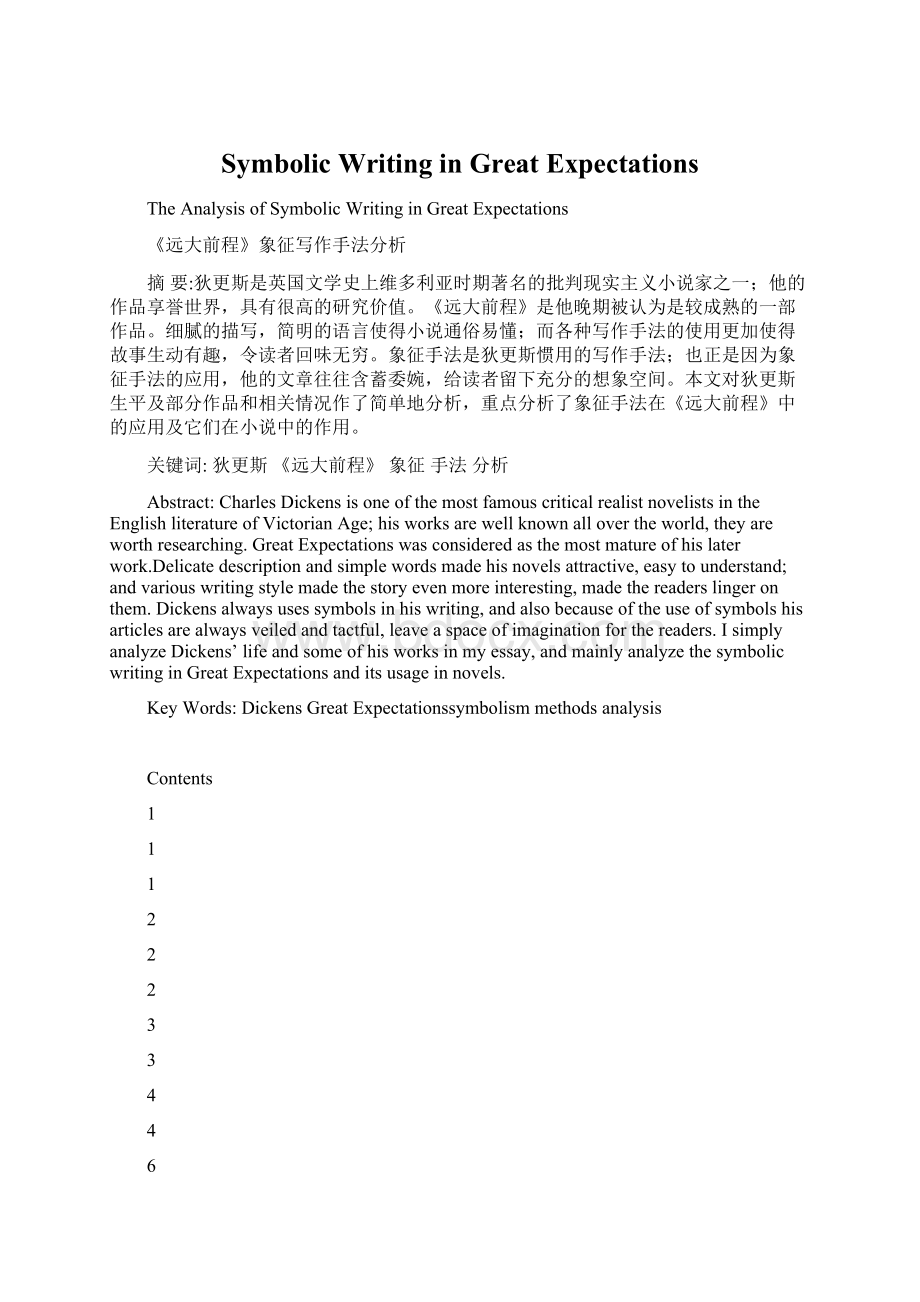Symbolic Writing in Great ExpectationsWord格式文档下载.docx
《Symbolic Writing in Great ExpectationsWord格式文档下载.docx》由会员分享,可在线阅读,更多相关《Symbolic Writing in Great ExpectationsWord格式文档下载.docx(15页珍藏版)》请在冰豆网上搜索。

象征手法是狄更斯惯用的写作手法;
也正是因为象征手法的应用,他的文章往往含蓄委婉,给读者留下充分的想象空间。
本文对狄更斯生平及部分作品和相关情况作了简单地分析,重点分析了象征手法在《远大前程》中的应用及它们在小说中的作用。
关键词:
狄更斯《远大前程》象征手法分析
Abstract:
CharlesDickensisoneofthemostfamouscriticalrealistnovelistsintheEnglishliteratureofVictorianAge;
hisworksarewellknownallovertheworld,theyareworthresearching.GreatExpectationswasconsideredasthemostmatureofhislaterwork.Delicatedescriptionandsimplewordsmadehisnovelsattractive,easytounderstand;
andvariouswritingstylemadethestoryevenmoreinteresting,madethereaderslingeronthem.Dickensalwaysusessymbolsinhiswriting,andalsobecauseoftheuseofsymbolshisarticlesarealwaysveiledandtactful,leaveaspaceofimaginationforthereaders.IsimplyanalyzeDickens’lifeandsomeofhisworksinmyessay,andmainlyanalyzethesymbolicwritinginGreatExpectationsanditsusageinnovels.
KeyWords:
DickensGreatExpectationssymbolismmethodsanalysis
Contents
1
2
3
4
6
7
9
10
13
17
Abstract………………………………………………………………
Keywords…………………………………………………………………
I.Introduction……………………………………………………………..
II.LiteratureReview………………………………………………….…
III.BriefIntroductionoftheWriter……………………………….…..
3.1.Thehistoricalbackgroundandthewriter’slife…………………………...
3.1.1ThehistoricalbackgroundofVictorianAge………………………..
3.1.2Dickens’life……………………………………………………………..
3.2.Dickens’mainworksandhiswritingstyle………………………………..
3.2.1BriefintroductionofDickens’mainworks……………………………
3.2.2Dickens’writingstyle…………………………………………………...
IV.AnalysisofSymbolicWriting………………………………………
4.1Briefintroductionofthenovel……………………………………………...
4.2Definitionofsymbol…………………………………………………………
4.3AnalysisofsymbolsinGreatExpectations…………………………………
4.3.1SymbolsinSatisHouse………………………………………………….
4.3.2SymbolsoutsideSatisHouse……………………………………………
V.Summary……………………………………………………………….
Reference………………………………………………………………….
I.Introduction
CharlesDickenswasoneofthemostfamouscriticalrealistnovelistsintheEnglishliteratureofVictorianAge;
hewrotelotsofnovelsandtheywereverypopularinthewholeword.Manyofhisworksweretranslatedintodifferentlanguages,andlotsofreadersweremovedbythestoriesinhisnovels.HewasconsideredasthegreatestEnglishrealistofVictorianAge.Inmyessay,I’mgoingtowritesomethingaboutsymbolicwritinginGreatExpectations.Mythoughtislikethis:
First,IwillintroducethewriterCharlesDickens,thehistorybackgroundinhistime,hislife;
hismainwork,andhiswritingstyle.Inmyopiniontheseareimportant,becausetheseallinfluencedthenovel.Second,givethedefinitionofsymbol,itsusageinwriting.Givethedefinitionisveryimportant,onlywhenyouknowthedefinitioncanyouknowhowitwasusedinaworkandtoanalysisit.InthethirdpartIwillmainlyanalyzesymbolsinthenovelGreatExpectations,thewriter’spurposeofthesesymbolsandwhatrolestheytakepartinthenovel;
thisisthemainbodyofmywriting.InthelastpartIwillsummarizethewholewriting.Thisisanoutlineofmyessay.
II.LiteratureReview
GreatExpectationsispopularwithpeopleforyears.Atfirst,Dickens’magazineAlltheYearRoundhadbecomeextremelypopularbasedonthesuccessofworksithadpublishedinserial,suchashisownworkATaleofTwoCitiesandWilkieCollins’sThewomaninwhite.ButithadexperiencedadeclineinpopularityafterpublishingadullserialbyCharlesLevercalledADay’sRide.DickensconceivedofGreatExpectationsasameansofrestoringhispublication’sfortunes.Thebookisstillimmenselypopularacenturyandahalflater.
OneofGreatExpectations’translatorscalledLuoZhiye(2000)wrote:
CharlesDickenswasoneofhisfavoritewriters;
hehadreadalmostmostofhiswork,andhaddeepimpressionofhim.HethoughtthatbecauseGreatExpectationswasCharlesDickens’latterwork,hehadexperiencedalot;
forthesurroundingsandhislifehehadnewanddeeperunderstanding.Sowhenwritingthisnovelheputallthesethoughtsandexperienceinit,itisamaturework.AnothertranslatorChangZixia(2003)pointsoutthatfromGreatExpectationsyoucanfindCharlesDickens’shadowofhisearlyday’slife.
ZhangBoxiang(2005),themainwriterofACoursebookofEnglishLiteraturepointsoutthatDickens’laterworksbecomeheavilysymbolic,notonlyprovidingtheworkapredominantatmospherebutalsohighlightingitscentralconcern.Sosymbolsareimportantinthisnovel,youcanfindalottowrite.
III.Briefintroductionofthewriter
3.1Thehistoricalbackgroundandthewriter’slife
Peoplewhohavereadlotsofarticlesindifferenttimesanddifferentcountriesmayfindthatnovelsareusuallydifferentaccordingtothehistoricalbackgroundandculturedifference.Generallyspeaking,anovelusuallyhassomefeaturesofthathistory;
andawriter’sworkusuallyhassomelikenessofhisownlifetosomeextent.Maybewecansayatime’sworkcanshowthattime’slifeandawriter’sworksarealwaysthewriterhisownlife’sportrait.SoIthinkit’snecessarytoknowthehistoricalbackgroundandthewriter’slife.DickenslivedintheVictorianageofEngland.ThemostimportantfeatureofthattimewasIndustrialRevolution.Inthenoveltherearemanydescriptionofthis.
3.1.1ThehistoricalbackgroundofVictorianAge
TheVictorianAgeperiodcoversthegreaterpartofthenineteenthcentury.TheearlyyearoftheVictorianBritainwasatimeofrapiddevelopmentaswellasserioussocialproblems.IndustrialRevolutionhadtransformedthesociallandscape,enablingcapitalistsandmanufacturerstoamasshugefortunes.Steam-poweredengineswereexploitedforrailwaysandironships,forloomsprintingpresses,andfarmers’combines;
scientificdiscoveriesandtechnologicinventionsquicklybroughtamazingchangestothecountry.“ForatimeBritainwasthe‘workshopoftheworld’;
largeamountofprofitwereaccumulatebothfromexpandingtrademarketsandfromexploitingitshuge-sizedcolonies.”(ZhangBoxiang2005:
147)Towardsthemid-century,Britainhadreacheditshighestpointofdevelopmentasaworldpower.GreatExpectationswasjustbasedonthepost-IndustrialRevolutionmodelofVictorianEngland.
3.1.2Dickens’life
CharlesDickenswasbornin1812atPortsmouth;
hislifewasfullofhardships.Whenhewasnine,hisfamilymovedtoLondon,andhisfatherwasarrestedandtakentoprisonfordebt.Hismothermovedhissevenbrothersandsistersintoprisonwithhisfather,butarrangedfortheyoungCharlestolivealoneoutsidetheprisonandworkwithotherchildrenpastinglabelsonbottlesinablackingwarehouse.Atthatperiodhesufferedalot,thejobwasmiserable;
hethoughthimselftoogoodforthejob,andalwaysearnedthecontemptoftheotherchildren.Tothisexperience,also,mayevidentlybetracednosmellpartoftheintensesympathywiththeoppressedpoor,especiallywiththehelplesschildren,whichissoprominentinhisnovels,likePipinGreatExpectations,OliverinOliverTwist,DavidinDavidCopperfieldandsoon.Afterhisfatherwasreleasedfromtheprison,Dickensretunedtoschool.Whenhewasfifteen,inordertoearnhisliving,CharlesworkedasaclerkinaLondonlawyer’soffice,whereheobservedallsortsandconditionsofpeoplewithcharacteristickeenness.InGreatExpectations,hedescribedsomecharactersthathavesomethingwithlawlike:
JaggersandtheclerkWemmick,theyareallvividandrealistic.Thereisnodoubtthatthisisduetohisexperienceofearlytime’swork.LaterhebecameaParliamentaryreporterfornewspapers.ThisexperienceenabledhimtogetacquaintedwiththeinsideoftheBritishlegalandpoliticalsystem,givehimthechancetometpeopleofallkinds,andpreparedhimbothinartandstuffforhiscomingliterarycareer.Hisliteraturecareerishardbutitisasuccessfulone.Afterleftlotsoffamousworksforus,in1870,hediedofoverwork
3.2Dickens’mainworksandhiswritingstyle
InDickens’shortlifehewrotealotofnovels,theyareallpopularwithpeople.Theyaredifferentstories,buttheyhavesomesamefeatures.Forexample:
mostofhisnovelsusesymbols;
mostofhismaincharactersarelittlepoorboys.Anotherexample:
DavidCopperfieldandGreatExpectationsallhavetwomaincharacters:
oneactorandonenarrator.Inthefollowingparagraph,Iwillwritethemonebyone.
3.2.1BriefintroductionofDickens’mainworks
DickenswasconsideredasthemostpopularandproductivenovelistsinVictorianAge.Duringhislife,hewrotealotofnovelswhichshowedusamostvividpictureoftheeverydaylifeoftheordinarypeopleofhistime;
peopleusuallydividedthemintotwoparts:
theearlyworks(1836-1850)andthelaterworks(1852-1870).Let’sjustseesomeofthem.
1)ThePickwickPaper(1836-1850)
DickenswasfirstfamousbyThePickwickPaper.Inthisnovelheattackstheuglysideofthepoliticalsystemofthetime;
however,itisstillfullofgaietyandhappylaughterofayouth.Lifeisstillpleasantandenjoyablethoughriskyfortheinnocentortheinexperienced;
theharmdoneisstillretrievable.Hewassaidasthemostfamouscriticalrealistnovelistsofthattime;
however,itseemsthatthemainpurposeofthisbookistoentertainratherthancriticize.
2)OliverTwist(1837-1839)
Thisnovelisbasedonreallifematerialsuchasthecurrenttrialofanotoriousfenceandthief-trainer.Bywritingthemostunfortunateexperienceofap